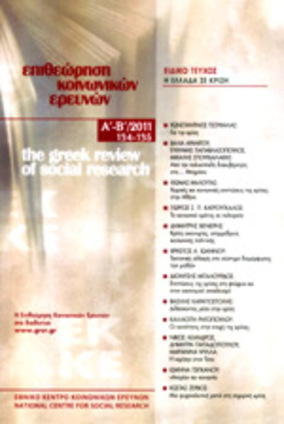Απλήρωτες υπερωρίες στην Ελλάδα : Προσδιοριστικοί παράγοντες και θεωρητικές ερμηνείες
Part of : Επιθεώρηση κοινωνικών ερευνών ; Vol.139, 2013, pages 4-24
Issue:
Pages:
4-24
Parallel Title:
Unpaid overtime in Greece : Determining factors and theoretical explanations
Section Title:
Articles
Abstract:
The rising of unpaid overtime is a recent trend in West Europe’s and North American labour markets. This phenomenon asks for explanation, since unpaid labour is not consistent with the prevalent economic paradigm. Various theoretical explanations have been proposed by the literature, within or outside the neoclassical framework, backed up with empirical testing. In this article, a literature review and an assessment of these explanations is offered, followed by an empirical investigation of the determinants of unpaid overtime for the Greek laborers. Based on these findings, theoretical conclusions and policy suggestions are been drawn.
Subject:
Subject (LC):
Keywords:
overtime, unpaid overtime, working time, labour supply, υπερωρίες, απλήρωτες υπερωρίες, χρόνος εργασίας, προσφορά εργασίας
Electronic Resources:
References (1):
- Akerlof G., 1982, «Labour contracts as a partial gift exchange», Quarterly Journal of Economics, vol. 97. Anger S., 2005, «Working time as an investment?- The effects of unpaid overtime on wages, promotions, and layoffs», German Institute for Economic Research (DIW Berlin) Discussion Papers. Anger S., 2008, «Overtime work as a signalling device», Scottish Journal of Political Economy, vol. 55, no 2. Bell D., Hart R., 1999, «Overtime working in an unregulated labour market», IZA Discussion Paper, no 44. Bell D., Hart R., Hubler O., Schwerdt W., 2000, «Paid and unpaid overtime work in Germany and the UK», IZA Discussion Paper, no 13. Booth A., Francesconi M., Zoega G., 2003, «Unions, work related training, and wages: Evidence from British men», IZA Discussion Paper, no 737. Campbell D., Green F., 2002, «The long term pay from working longer hours», Department of Economics Discussion Papers Archive at the University of Kent. Contensou F., Vranceanu R., 2000, Working time: Theory and policy implications, Cheltenham, UK, Northampton, MA, USA, E. Elgar Pub. Cramer J., 2004, «The early origins of the logit model», Studies in History and Philosophy of Biological and Biomedical Science, vol. 35. Glebbeek A., Wielers R., Lindenberg S., 2007, «The puzzle of unpaid overtime: Can the time greediness of post-Fordist work be explained?» in T. van der Lippe en P. Peters (eds), Competing claims in work and family life, Cheltenham, Edward Elgar. Green W., 2000, Econometric analysis, 4th ed., Englewood Cliffs, N.J., Prentice Hall. Gujarati D., 2003, Basic econometrics, International Edition, New York, Mc Graw- Hill. Hart R., 2004, The economics of overtime working, Cambridge, Cambridge University Press. Hetrick R., 2000, «Analyzing the recent upward surge in overtime hours», Monthly Labour Review. Maddala G., 1983, Limited – dependent and qualitative variables in econometrics, New York, Cambridge University Press. Marx K., 1867, Capital, vol. I, London, Penguin. Meyer A., Wallette W., 2005, «Absence of absenteeism and overtime work – Signaling factors for temporary workers?», Working Papers 2005:15, Lund University, Department of Economics. Pannenberg M., 2005, «Long term effects of unpaid overtime, evidence from West German», Scottish Journal of Political Economy, vol. 52, no 2. Pindyck R., Rubinfield D., 1976, Econometric models and economic forecasts, 2nd edition, New York, Mc Grow – Hill.




